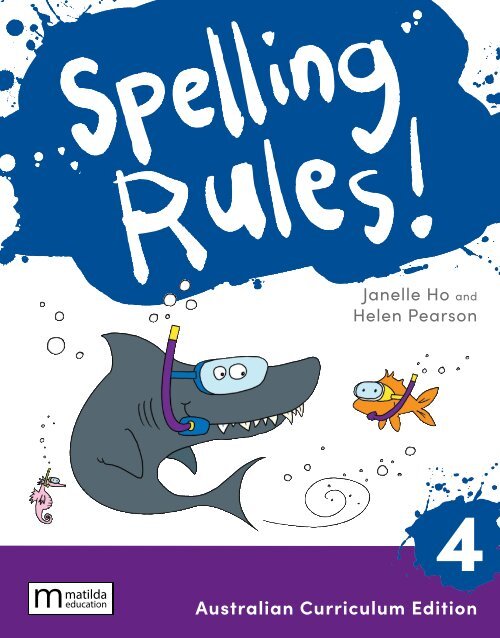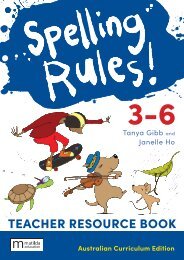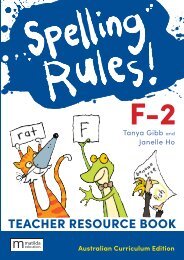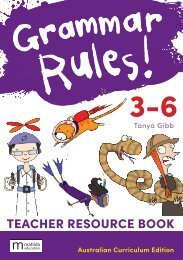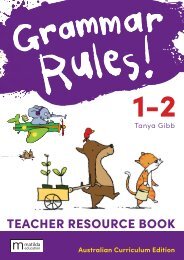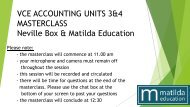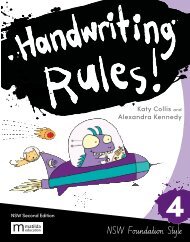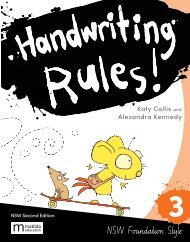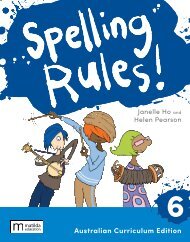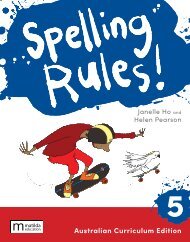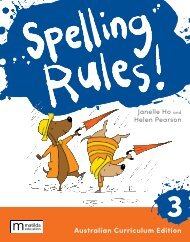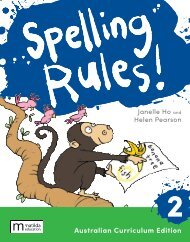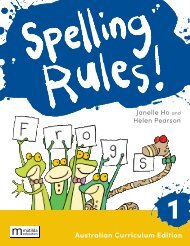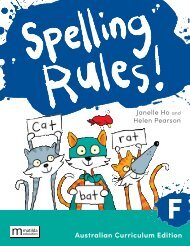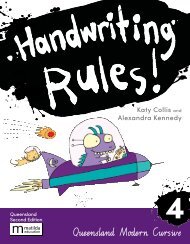Spelling Rules! 4 Australian Curriculum 3e sample/look inside
Create successful ePaper yourself
Turn your PDF publications into a flip-book with our unique Google optimized e-Paper software.
Janelle Ho and<br />
Helen Pearson<br />
4<br />
<strong>Australian</strong> <strong>Curriculum</strong> Edition
Janelle Ho and<br />
Helen Pearson<br />
STUDENT<br />
BOOK<br />
4<br />
<strong>Australian</strong> <strong>Curriculum</strong> Edition<br />
Name:<br />
Class:
Contents<br />
Scope and Sequence.......................................................... 3<br />
Note to Teachers and Parents.......................................... 4<br />
Units 1–35.............................................................................. 6–75<br />
List Words in Unit Order..................................................... 76<br />
List Words in Alphabetical Order..................................... 78<br />
<strong>Spelling</strong> <strong>Rules</strong> and Tips...................................................... 80<br />
SLLURP<br />
SLLURP summarises the spelling strategies that you can use to learn new words.<br />
Say<br />
Listen<br />
Look<br />
Understand<br />
Remember<br />
Practise<br />
Say the word carefully and slowly to yourself.<br />
Listen to how each part of the word sounds in sequence.<br />
Look at the patterns of letters in the word and the shape of the word.<br />
Understand rules, word meanings and word origins.<br />
Remember all the similar words you can already spell and relate<br />
this knowledge to any new word.<br />
Practise writing the word until it is firmly fixed in your long-term<br />
memory.<br />
2 <strong>Spelling</strong> <strong>Rules</strong>! Student Book 4 (ISBN 9780655092704) © Janelle Ho, Helen Pearson
Scope and Sequence<br />
Unit Vowels Consonants<br />
1<br />
2<br />
3<br />
4<br />
5<br />
two-syllable<br />
words with long<br />
sounds, silent e<br />
Letter<br />
patterns<br />
SKILL FOCUS<br />
Morphology and<br />
etymology<br />
-s, -es, -ed, -ing:<br />
dropping silent e<br />
short and long y ay, ey, oy -s, -es, -ed, -ing:<br />
changing y to i<br />
words ending<br />
in lf<br />
words ending<br />
in double<br />
consonants<br />
adding -ed, -ing to twosyllable<br />
words: doubling<br />
final consonant<br />
Homophones/<br />
Confusing<br />
words<br />
pray/prey<br />
Topic<br />
words<br />
<strong>Spelling</strong> <strong>Rules</strong>! Student Book 4 (ISBN 9780655092704) © Janelle Ho, Helen Pearson<br />
oppose, endure, revise, complete, arrange, escape,<br />
persuade, realise, collide, assume, include, declare<br />
copy, hurry, guilty, mystery, variety, deny, apply, simplify,<br />
qualify, display, prey, annoy<br />
begin, forget, regret, occur, prefer, enter, offer, visit, happen,<br />
target, label, detail<br />
ph, gh phobia engulf, behalf, cough, trough, phase, phobia, phantom,<br />
metaphor, emphasise, biography, amphibian, sophisticated<br />
-er, -est<br />
6 REVISION<br />
7<br />
8<br />
9<br />
10<br />
11<br />
ea<br />
led/lead, weather/<br />
whether<br />
-ion, -ness; claudere<br />
odd, stiff, err, recall, install, swell, thrill, floss, discuss,<br />
possess, witness, embarrass<br />
least, eager, release, dread, ahead, heavy, health, meant,<br />
instead, pleasant, jealous, weather<br />
direction, suggestion, location, separation, confusion,<br />
decision, conclusion, greatness, selfishnesss, stubbornness,<br />
cleanliness, forgetfulness<br />
j ge, dge, dj bandage, sponge, surge, stranger, siege, badger, pledge,<br />
reject, injection, adjust, conjunction, adjective<br />
un-, in-, dis-; videre<br />
confusing pairs<br />
12 REVISION<br />
13<br />
14<br />
15<br />
16<br />
17<br />
unfamiliar, undeveloped, unbroken, unquestioning,<br />
inactive, incomplete, informal, invisible, disease, disqualify,<br />
discontented, discontinue<br />
lose, loose, breath, breathe, desert, dessert, practise,<br />
practice, wonder, wander, stationery, stationary<br />
oa, ou ow fowl/foul narrow, sorrow, tomorrow, loan, poach, coward, foul,<br />
announce, voucher, boundary, council, knowledge<br />
er/ear<br />
verse, superb, alert, convert, deserve, determined, certain,<br />
permanent, earthquake, research, earnest, rehearsal<br />
or, ur, our court- worthy, senior, surprise, further, burden, survive, journal,<br />
flavour, labour, courtesy, honour, nourish<br />
words ending<br />
in ure<br />
thermo-, -meter<br />
18 REVISION<br />
19<br />
20<br />
21<br />
22<br />
23<br />
double<br />
consonants<br />
words ending<br />
in ic<br />
words ending<br />
in al<br />
colours,<br />
similes<br />
-th fourth/forth ordinal<br />
numbers<br />
-ic; -ed, -ing: adding k<br />
-al, il-, un-<br />
nature, future, capture, failure, creature, feature, measure,<br />
pleasure, leisure, adventure, furniture, temperature<br />
ruby, scarlet, lilac, violet, emerald, indigo, crimson, azure,<br />
khaki, ochre, turquoise, sapphire<br />
fourth, fifth, eighth, ninth, twelfth, growth, warmth, length,<br />
strength, width, depth, breadth<br />
panic, picnic, magic, logic, critic, basic, mimic, fantastic,<br />
terrific, energetic, automatic, enthusiastic<br />
capital, hospital, final, logical, magical, national, natural,<br />
digital, criminal, critical, survival, emotional<br />
-th, hyphenation numbers eleven, twelve, thirteen, fourteen, fifteen, twenty, thirty, forty,<br />
fifty, ninety, hundred, thousand<br />
accept/except,<br />
affect/effect<br />
24 REVISION<br />
25<br />
26<br />
27<br />
28<br />
29<br />
soft g<br />
words ending<br />
in ous<br />
-ous; rules for adding<br />
-ous<br />
-en, -ise: rules for<br />
adding -en, ise; memor<br />
-ment<br />
compound words;<br />
abbreviations<br />
30 REVISION<br />
31<br />
32<br />
33<br />
34<br />
computers<br />
accept, accuse, attempt, attitude, pollute, approach, disappoint,<br />
opportunity, necessary, recommend, occasion, aggressive<br />
ginger, gently, general, average, generous, religion,<br />
intelligent, fragile, generation, advantage, emergency,<br />
gymnasium<br />
serious, precious, delicious, famous, nervous, dangerous,<br />
courageous, furious, cautious, envious, spacious, various<br />
lessen, stiffen, toughen, sadden, awaken, straighten, finalise,<br />
memorise, fantasise, energise, sympathise, visualise<br />
movement, statement, argument, amazement,<br />
measurement, government, environment, treatment,<br />
development, attachment, encouragement, disappointment<br />
computer, laptop, email, internet, mobile, keyboard,<br />
program, download, insert, delete, icon, archive<br />
ie, ei rain/rein/reign niece, belief, achieve, alien, receipt, deceive, protein, weird,<br />
reign, seize, beige, feisty<br />
ex<br />
-or, -er, -ant, -ian, -ist;<br />
apostrophes<br />
35 REVISION<br />
occupations;<br />
non-English<br />
words<br />
holidays<br />
WORD LIST<br />
exist, exchange, examination, explosion, expensive,<br />
exaggerate, excursion, exceed, except, extinct, exhausted,<br />
exhibition<br />
author, grocer, carpenter, lawyer, assistant, accountant,<br />
electrician, politician, journalist, pharmacist, chef, pilot<br />
travel, relax, journey, caravan, luggage, budget, museum,<br />
attraction, entertainment, accommodation, sightseeing,<br />
restaurant<br />
3
Note to teachers and parents<br />
<strong>Spelling</strong> <strong>Rules</strong>!<br />
Some students are natural spellers. But the vast majority of students need formal, systematic and sequential instruction about<br />
the way spelling works and the strategies they can use to become independent, confident spellers and spelling risk-takers.<br />
The <strong>Spelling</strong> <strong>Rules</strong>! program is based on sound linguistic and pedagogical theory. It is informed by research into how<br />
students of different ages acquire and apply spelling skills, and how those skills move from the working to the long-term<br />
memory. The program closely follows the <strong>Australian</strong> English curriculum. <strong>Australian</strong> <strong>Curriculum</strong>: English references are<br />
provided in the Teacher Resource Books. The program consists of seven student books, fully supported by two Teacher<br />
Resource Books.<br />
Each student book contains units of work, with each unit designed to be used over the course of a week. The content of<br />
each unit simultaneously develops new skills and reinforces skills from previous units. The introduction of new sounds and<br />
letter patterns is logically sequenced and takes into account both frequency of use and complexity. Where appropriate,<br />
topic words from other curriculum areas such as mathematics, science and social sciences are included. When spelling<br />
rules are introduced, only known sounds and letter patterns are used so that students focus on one skill at a time. Regular<br />
revision units enable teachers to assess student progress and reinforce key rules and patterns from previous units.<br />
The <strong>Spelling</strong> <strong>Rules</strong>! program also incorporates elements of self-assessment. A simple reflection activity allows students<br />
to assess their own progress and provides you with a starting point for discussion.<br />
<strong>Spelling</strong> knowledge<br />
Learning to spell involves developing different kinds of spelling knowledge:<br />
T Kinaesthetic knowledge – the physical feeling when saying different sounds and words, and when writing<br />
the shapes of letters and words<br />
T Phonological knowledge – how a word sounds and the patterns of sounds in words<br />
T Visual knowledge – how letters and words <strong>look</strong> and the visual patterns in words<br />
T Morphemic knowledge – the meaning or function of words or parts of words<br />
T Etymological knowledge – the origins and history of words and the effect this has on spelling patterns.<br />
Icons used in Student Book 4<br />
The following icons identify the main spelling strategy that students will use to complete an activity.<br />
Say the word. (Kinaesthetic knowledge)<br />
These activities ask students to experience how<br />
sounds feel in the mouth and jaw. Changing the positions<br />
of the jaw, lips and tongue changes the sounds we make.<br />
Encourage students to pronounce the sounds and words<br />
accurately. If they mispronounce a sound or word, they<br />
may misrepresent it in writing.<br />
Listen to the word. (Phonological knowledge)<br />
These activities focus on discriminating between<br />
different sounds and breaking up words into syllables or<br />
individual sound segments (phonemes).<br />
Look at the word. (Visual knowledge) These<br />
activities help students to see how the sound<br />
is represented using combinations of letters, and to<br />
associate this visual pattern with what they are hearing.<br />
Students will develop the ability to know when a word<br />
does or does not ‘<strong>look</strong> right’.<br />
Understand the word. (Morphemic and<br />
etymological knowledge) These activities focus on<br />
word meanings, word families, prefixes and suffixes,<br />
4 <strong>Spelling</strong> <strong>Rules</strong>! Student Book 4 (ISBN 9780655092704) © Janelle Ho, Helen Pearson<br />
spelling rules, word origins and so on, which help embed<br />
spelling in the long-term memory.<br />
Practise writing the word. (Kinaesthetic<br />
knowledge) These activities develop students’<br />
awareness of the physical movement involved in writing<br />
the word. By practising writing the word a number of<br />
times and in different contexts, the spelling becomes<br />
embedded in the long-term memory.<br />
I can do this.<br />
I am not sure.<br />
I need help.<br />
This icon highlights useful spelling rules.<br />
This icon tells students that a special clue<br />
or hint is provided for an activity. It may<br />
be a spelling, grammar or punctuation<br />
convention, or a definition of a useful term.<br />
Encourages students to assess their<br />
progress across each unit.
Student Book 4<br />
Units of work<br />
Student Book 4 contains 35 weekly units of work. See the Scope and Sequence chart on page 3 for more<br />
information. Each revision unit gives students an opportunity to self-assess.<br />
Word lists<br />
In Student Book 4, each unit (except Revision) has a list of spelling words. The core words in the lists have been chosen<br />
to support the learning focus and strategies being taught in the unit.<br />
<strong>Spelling</strong> lists enable a spelling element to be focused on, and provide sufficient examples to consolidate the<br />
teaching point. Topic words come from other curriculum areas, such as mathematics and social sciences. In addition,<br />
homophones and words that are easily confused with each other are explained and practised.<br />
SLLURP<br />
Each word list begins with a reminder for students to SLLURP. SLLURP summarises the strategies that will help spelling<br />
move from students’ working memory to their long-term memory. These strategies are provided on page 2, for easy<br />
reference.<br />
Unit at a glance<br />
SLLURP reminds students<br />
about strategies they can use<br />
to learn the words<br />
Unit banner<br />
features the spelling<br />
focus in the context<br />
of an amazing fact<br />
<strong>Spelling</strong> focus<br />
highlighted in<br />
colour<br />
Sequenced activities<br />
– each activity focuses<br />
on a specific spelling<br />
strategy. Some activities<br />
refer to content in other<br />
curriculum areas<br />
List words support the<br />
learning of the spelling<br />
focus for the unit. Words<br />
come from across the<br />
curriculum<br />
Space to practise list<br />
words; to write theme<br />
words, personal words<br />
or extension words; or<br />
to practise other words<br />
with the same spelling<br />
focus. Adapt this section<br />
to suit the needs of<br />
your class<br />
19<br />
Say Listen Look Understand Remember Practise<br />
3<br />
fourth<br />
fifth<br />
eighth<br />
ninth<br />
twelfth<br />
growth<br />
warmth<br />
length<br />
strength<br />
width<br />
depth<br />
breadth<br />
Add th to make the noun form.<br />
Write an adjective for each numeral.<br />
1 2<br />
3 4<br />
5 6<br />
7 8<br />
9 10<br />
11 12<br />
Write two number adjectives that drop<br />
letters before adding th. Write the dropped<br />
letter or letters in the box.<br />
warm long wide<br />
true strong broad<br />
young<br />
Ants have a lot of strength<br />
for their size. Some ants<br />
can drag objects that are<br />
25 times their own weight.<br />
Some words add th to make the noun form.<br />
grow growth<br />
The vowel or vowels sometimes change too.<br />
deep depth<br />
Which nouns keep the vowels but sound different?<br />
I<br />
2<br />
Most numbers add th to make the<br />
adjective form.<br />
If Monday is the first day of the week, Thursday is the<br />
August is the<br />
The letter i is the<br />
month of the year.<br />
letter of the alphabet.<br />
I can do this.<br />
I am not sure.<br />
42 <strong>Spelling</strong> <strong>Rules</strong>! Student Book 4 (ISBN 9780655092704) © Janelle Ho, Helen Pearson<br />
<strong>Spelling</strong> <strong>Rules</strong>! Student Book 4 (ISBN 9780655092704) © Janelle Ho, Helen Pearson<br />
43<br />
4<br />
On your<br />
Venus is the<br />
Fill in the missing adjectives.<br />
A centenary celebration marks the<br />
5<br />
oval<br />
hexagon<br />
pentagon<br />
6<br />
birthday, you celebrate a decade of life.<br />
planet from the Sun.<br />
year of an event.<br />
Write a sentence about each shape. The first one is done for you.<br />
Half of the oval is shaded.<br />
Write list words.<br />
Use a ruler to measure the<br />
Steel is a strong metal. Its<br />
7<br />
8<br />
Describe a mythical creature with incredible strength.<br />
day.<br />
of wrapping paper you need.<br />
Fourth and forth are homophones. Colour the correct word.<br />
This is the fourth forth time I’ve seen this movie.<br />
The lion was pacing back and fourth forth in his cage.<br />
makes it an ideal building material.<br />
I need help.<br />
Icons identify the<br />
main spelling strategy<br />
students will use in<br />
an activity<br />
<strong>Spelling</strong> tips and<br />
rules introduced<br />
when students need<br />
them to complete an<br />
activity<br />
Reflection<br />
Allows students to<br />
assess their progress<br />
<strong>Spelling</strong> <strong>Rules</strong>! Teacher Resource Book 3-6<br />
Full teacher support for Student Book 4 is provided by <strong>Spelling</strong> <strong>Rules</strong>! Teacher Resource Book 3–6. Here you will<br />
find valuable background information about spelling development and spelling knowledge, along with practical<br />
resources, such as:<br />
T teaching tips for every unit in Student Book 4<br />
T extra word lists<br />
T strategies for teaching spelling<br />
T guidelines for assessment and diagnosis of errors<br />
T activities to support struggling spellers<br />
T worthwhile extension for more able spellers.<br />
<strong>Spelling</strong> <strong>Rules</strong>! Student Book 4 (ISBN 9780655092704) © Janelle Ho, Helen Pearson<br />
5
1<br />
In China in 3000 bce, children had<br />
powdered smallpox scabs stuck up their<br />
noses to make them immune to the<br />
horrible disease smallpox. It worked!<br />
Say Listen Look Understand Remember Practise<br />
oppose<br />
endure<br />
revise<br />
complete<br />
arrange<br />
escape<br />
persuade<br />
realise<br />
collide<br />
assume<br />
include<br />
declare<br />
I<br />
Group list words using the final vowel sound.<br />
a as in day<br />
e as in bead<br />
o as in soap<br />
i as in by<br />
u as in dew<br />
list words left over<br />
2<br />
Write a list word that rhymes.<br />
flows strange maid replied repair<br />
3<br />
Divide these list words into syllables. Underline the stressed syllable. For double consonants<br />
in the middle of a word, the syllable break comes between the double letters. assume<br />
realise suppose declare revise<br />
arrange conclude collide escape<br />
6 <strong>Spelling</strong> <strong>Rules</strong>! Student Book 4 (ISBN 9780655092704) © Janelle Ho, Helen Pearson
4<br />
Antonyms are words with opposite meanings. Make antonyms by adding missing<br />
letters.<br />
in — — ude e — cl — d — ins — — t del — t —<br />
inc — ea — e d — cr — — s — s — p — — ate c — mb — n —<br />
If a word ends in silent e, drop the e before adding the suffixes ed<br />
or ing.<br />
5<br />
Complete the table.<br />
word add ed add ing<br />
waste wasted wasting<br />
oppose<br />
realise<br />
endure<br />
complete<br />
arrange<br />
collide<br />
6<br />
Add s, ed or ing to the word in brackets.<br />
No one<br />
the student dressed as a clown. (recognise)<br />
‘Stop<br />
me whenever you lose something!’ Vicki yelled. (blame)<br />
Each class is<br />
to perform an item at assembly. (require)<br />
When a chess piece is captured, it is<br />
from the board. (remove)<br />
7<br />
Add vowels to make words that match the clues.<br />
r — sc — — save from danger r — m — v — take away<br />
pr — v — d — supply — ll — str — t — draw<br />
r — t — t — turn<br />
p — r f — m — pleasant fragrance<br />
<strong>Spelling</strong> <strong>Rules</strong>! Student Book 4 (ISBN 9780655092704) © Janelle Ho, Helen Pearson<br />
I can do this.<br />
I am not sure.<br />
I need help.<br />
7
2<br />
Nobody knows for certain how<br />
the pyramids in Egypt were<br />
built. It remains a mystery!<br />
Say Listen Look Understand Remember Practise<br />
copy<br />
hurry<br />
guilty<br />
mystery<br />
variety<br />
deny<br />
apply<br />
simplify<br />
qualify<br />
display<br />
prey<br />
annoy<br />
I<br />
hair<br />
fur<br />
mess<br />
itch<br />
If the word has a single vowel<br />
followed by a single consonant,<br />
double the consonant before<br />
adding y. mud muddy<br />
Make adjectives by adding y. Remember to<br />
follow the rule you have just learnt.<br />
shine<br />
risk<br />
spot<br />
grub<br />
dirt<br />
guilt<br />
noise<br />
droop<br />
If a word ends in y, change y to i before adding es or ed.<br />
Keep the y when adding ing.<br />
2<br />
Complete the table.<br />
word add es add ed add ing<br />
hurry<br />
deny<br />
reply<br />
simplify<br />
qualify<br />
8 <strong>Spelling</strong> <strong>Rules</strong>! Student Book 4 (ISBN 9780655092704) © Janelle Ho, Helen Pearson
3<br />
What is the weather like?<br />
4<br />
Rewrite each sentence, replacing the underlined word with a list word.<br />
Troy felt regretful that his ball had broken his neighbour’s window.<br />
Grandma’s patchwork quilts have a range of colours and patterns.<br />
What happened to Sally’s keys is a puzzle.<br />
Of all the animals on show, my favourite is the giraffe.<br />
Don’t bother Amy while she is coding her robot.<br />
5<br />
Rewrite each sentence in the plural.<br />
There is only one variety of apple in the store.<br />
Auntie made a copy of the recipe for Mum.<br />
I have a fantasy about what I want to be when I grow up.<br />
6<br />
prey and pray are homophones. Write the correct homophone.<br />
As the king of the jungle, the lion has many .<br />
You can’t just<br />
. You also have to work hard!<br />
The plural form of prey does not change. Such words are known as<br />
I can do this.<br />
I am not sure.<br />
I need help.<br />
<strong>Spelling</strong> <strong>Rules</strong>! Student Book 4 (ISBN 9780655092704) © Janelle Ho, Helen Pearson<br />
9
3<br />
The left side of your<br />
body is controlled by the<br />
right side of your brain.<br />
Say Listen Look Understand Remember Practise<br />
3<br />
begin<br />
forget<br />
regret<br />
occur<br />
prefer<br />
enter<br />
offer<br />
answer<br />
visit<br />
happen<br />
target<br />
label<br />
detail<br />
Write three list words that have<br />
a short final vowel sound.<br />
Write three list words that have<br />
a long final vowel sound.<br />
short final vowel long final vowel<br />
I<br />
2<br />
travel<br />
permit<br />
Each word has two syllables. Say each<br />
word and draw a line between the syllables.<br />
Underline the stressed syllable. gallop<br />
begin regret occur<br />
excel forget admit<br />
When adding ed or ing, double<br />
the final consonant if:<br />
1. the stress is on the final syllable<br />
and<br />
2. the final syllable has one vowel.<br />
occur<br />
Complete the table.<br />
add ed<br />
occurred, occurring<br />
expel<br />
regret<br />
add ing<br />
If the final syllable has two<br />
vowels, just add ed or ing.<br />
appeal<br />
appealed, appealing<br />
4<br />
Complete the table.<br />
add ed<br />
add ing<br />
appear<br />
detail<br />
complain<br />
reveal<br />
10 <strong>Spelling</strong> <strong>Rules</strong>! Student Book 4 (ISBN 9780655092704) © Janelle Ho, Helen Pearson
5<br />
Add a suffix to each list word. Use the rules to decide if the final consonant should be<br />
doubled. The stressed syllable is underlined.<br />
word<br />
add ed<br />
word<br />
add ing<br />
prefer<br />
begin<br />
happen<br />
forget<br />
enter<br />
offer<br />
regret<br />
occur<br />
visit<br />
label<br />
target<br />
detail<br />
Tip!<br />
z<br />
A word family consists of words that share the same base word.<br />
act, actor, action, acting, acted, active, react<br />
6<br />
Complete each sentence using a word from the same word family as the word in brackets.<br />
People sometimes get<br />
as they get older. (forget)<br />
Mum is making a special dessert because we are having<br />
. (visit)<br />
Rani wanted to learn guitar so she joined a class for<br />
. (begin)<br />
Sean said he would meet me at the<br />
to the swimming pool. (enter)<br />
You must wear<br />
goggles for this experiment. (safe)<br />
7<br />
Use list words to answer the questions.<br />
Which word uses the same vowel sound twice?<br />
Which two words have the same meaning?<br />
and<br />
I can do this.<br />
I am not sure.<br />
I need help.<br />
<strong>Spelling</strong> <strong>Rules</strong>! Student Book 4 (ISBN 9780655092704) © Janelle Ho, Helen Pearson<br />
11
4<br />
The fear of amphibians<br />
is known as<br />
batrachophobia.<br />
Say Listen Look Understand Remember Practise<br />
3<br />
engulf<br />
behalf<br />
cough<br />
trough<br />
phase<br />
phobia<br />
phantom<br />
metaphor<br />
emphasise<br />
biography<br />
amphibian<br />
sophisticated<br />
loaf<br />
self<br />
calf<br />
hoof<br />
sniff<br />
wharf<br />
Use the rules to write the<br />
plural word.<br />
I<br />
2<br />
Say each word aloud. Circle the word if you<br />
do not say the l.<br />
calf wolf self<br />
half gulf shelf<br />
Write f, ff, gh or ph.<br />
roo cli gra<br />
blu rase inish<br />
dwar lau ield<br />
rou brie oto<br />
Which digraph cannot begin a word?<br />
When a word ends in f, lf or fe, the<br />
f or fe usually changes to v before<br />
adding es to make the word plural.<br />
leaf leaves elf elves<br />
half halves<br />
When a word ends in ff, add s to<br />
make the word plural.<br />
cliff cliffs<br />
Add s to make these words plural.<br />
gulf gulfs proof proofs<br />
chief chiefs belief beliefs<br />
reef reefs roof roofs<br />
4<br />
Write the list words that are only nouns.<br />
12 <strong>Spelling</strong> <strong>Rules</strong>! Student Book 4 (ISBN 9780655092704) © Janelle Ho, Helen Pearson
5<br />
6<br />
Use the clues to find ph words that complete the puzzle. Use a dictionary if you need help.<br />
a stage of development<br />
a group of words<br />
another word for ghost<br />
a wild bird you can eat<br />
a medical doctor<br />
a person who works in a pharmacy<br />
a person who studies philosophy<br />
The word phobia is both a word and a word part. It can be combined with other word<br />
parts to describe different types of fear. Use a dictionary to write the meanings.<br />
arachnophobia<br />
acrophobia<br />
nyctophobia<br />
ophidophobia<br />
7<br />
Proofread this story. The text has five words that are incorrect. Circle the mistakes.<br />
Then write the correct spelling of the words in the boxes.<br />
Mrs Berg’s neffew tragically became an orfan when his parents died while<br />
swimming with dolfins. The dangers had been emfasised but their love of wildlife<br />
meant they took risks as fotografers. Ralph lives with the Bergs now.<br />
8<br />
Colour the correct word.<br />
Our team scored a goal in each of the two halfs half’s halves of the match.<br />
I have so many books I need more shelfs shelf’s shelves .<br />
A wolfs wolf’s wolves eyesight is better than a human’s.<br />
Cliff’s sniffs sniff’s are loud and annoying.<br />
Can we go fishing of off the wharf on Saturday?<br />
<strong>Spelling</strong> <strong>Rules</strong>! Student Book 4 (ISBN 9780655092704) © Janelle Ho, Helen Pearson<br />
I can do this.<br />
I am not sure.<br />
I need help.<br />
13
5<br />
Levi Spear Parmly<br />
recommended using a<br />
waxen silk thread to floss.<br />
That was in 1819.<br />
Say Listen Look Understand Remember Practise<br />
odd<br />
stiff<br />
err<br />
recall<br />
install<br />
swell<br />
thrill<br />
floss<br />
discuss<br />
possess<br />
witness<br />
embarrass<br />
I<br />
2<br />
Tip!<br />
z<br />
A syllable that has double consonants<br />
at the end has a single vowel.<br />
odd not oodd<br />
Correct the following words.<br />
swell not sweell<br />
stieff flooss stil<br />
discuess witnes poesess<br />
Unscramble the letters to make a word that<br />
ends in a double consonant.<br />
lrhitl slepl slnailt<br />
sarbs fastf darseds<br />
z<br />
The suffixes<br />
er and est are<br />
added to words<br />
to compare two<br />
or more things.<br />
kind kinder<br />
kindest<br />
3<br />
Add the word with the correct suffix.<br />
It’s odd to see Joe with short hair but it’s<br />
to see him wearing a shirt and tie!<br />
There are many dull books on the shelf. Unfortunately<br />
for me, I think I picked the .<br />
z<br />
Some words that<br />
end in double<br />
consonants need<br />
to add y first.<br />
mess messy<br />
messier messiest<br />
4<br />
Write the correct form of the adjective.<br />
Jess says Ben is the<br />
player on the<br />
field. (boss)<br />
Mr Cross is<br />
than Mr Bell about how<br />
we present our work. (fuss)<br />
14 <strong>Spelling</strong> <strong>Rules</strong>! Student Book 4 (ISBN 9780655092704) © Janelle Ho, Helen Pearson
5<br />
An anagram is a word or phrase in which the letters can be rearranged to form<br />
another word or phrase. Write a list word for each anagram.<br />
nil salt its news caller bears arms<br />
6<br />
Add the suffix.<br />
add s or es<br />
add ed<br />
add ing<br />
chill<br />
add<br />
bluff<br />
witness<br />
discuss<br />
swell<br />
install<br />
stuff<br />
stress<br />
embarrass<br />
7<br />
Use the clues to write list words.<br />
Which word has the antonym of short?<br />
Which word has a donkey in it?<br />
Which word has sickness in it?<br />
Which word has the antonym of sickness?<br />
8<br />
Imagine you have witnessed a robbery. Write your eyewitness account.<br />
9<br />
re + call = recall<br />
Write other words that use the prefix re.<br />
I can do this.<br />
I am not sure.<br />
I need help.<br />
<strong>Spelling</strong> <strong>Rules</strong>! Student Book 4 (ISBN 9780655092704) © Janelle Ho, Helen Pearson<br />
15


